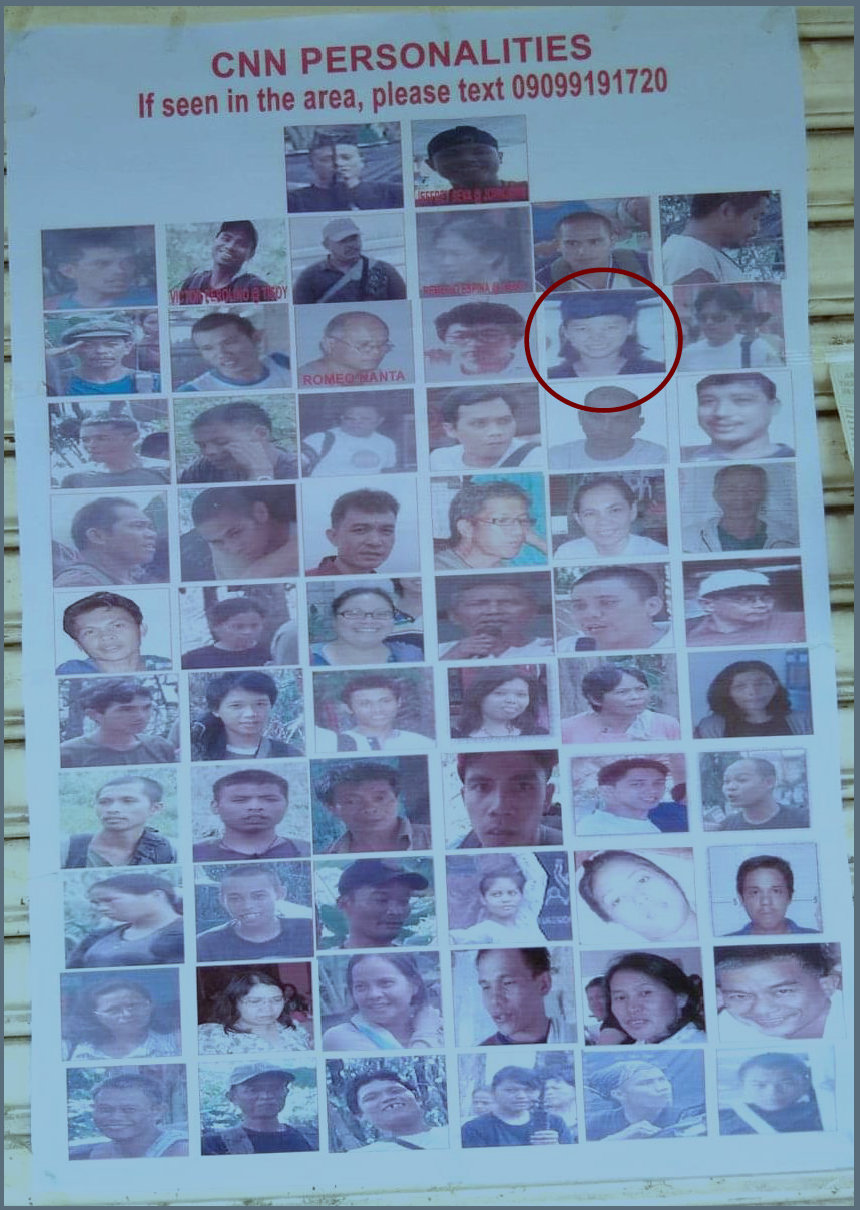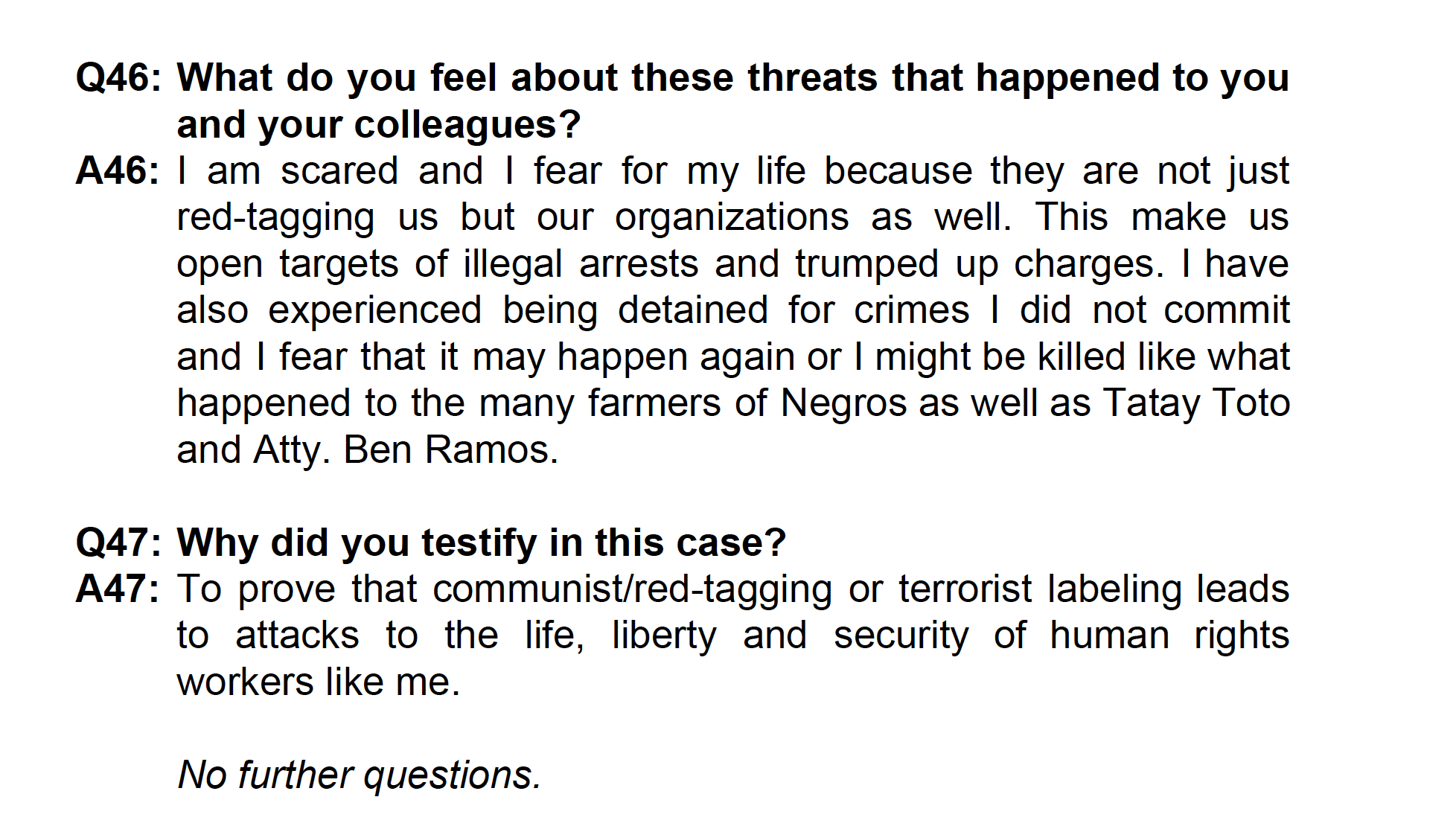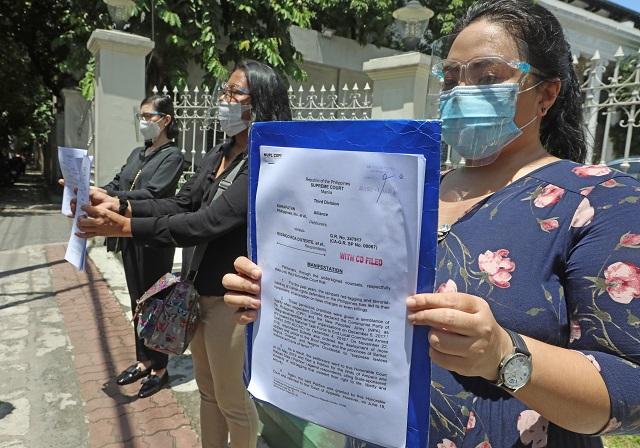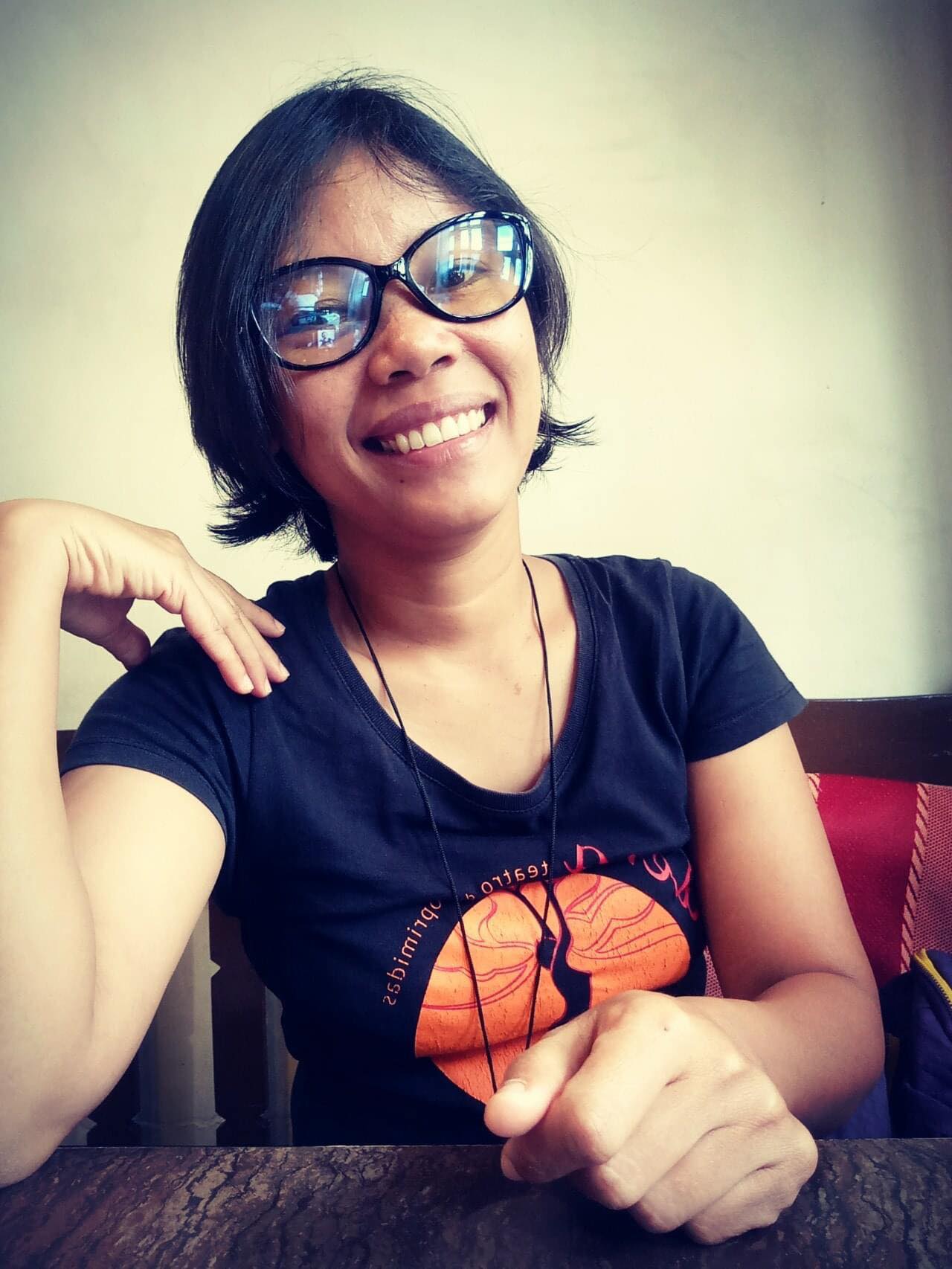We use cookies to ensure you get the best browsing experience. By continued use, you agree to our privacy policy and accept our use of such cookies. For further information, click FIND OUT MORE.
By NICOLE-ANNE C. LAGRIMAS
October 13, 2020
In 2018, policemen in Moises Padilla town in Negros Occidental placed a tarpaulin in front of the public market and police station.
On it were pictures of around 60 individuals the authorities said were terrorists. The police posted a number to call if residents saw any one of the “Communist personalities.”
The faces of lawyer Benjamin Ramos and human rights workers Bernardo “Toto” Patigas, Zara Alvarez, and Clarizza Singson-Dagatan were all on the tarp.
“I am scared and I fear for my life because they are not just red-tagging us but our organizations as well,” Alvarez said in a sworn statement when she and other activists asked for a writ of amparo before the Court of Appeals in 2019.
Ramos was a founding member of the National Union of Peoples’ Lawyers and Patigas was an Escalante City councilor and the secretary general of the Northern Negros Alliance of Human Rights Advocates.
Ramos was killed in 2018. Patigas, in 2019.
“I fear that… I might be killed like what happened to the many farmers of Negros as well as Tatay Toto and Atty. Ben Ramos,” Alvarez said in the same sworn statement.
The fear remained even after she moved to a new boarding house. Singson, her friend and colleague, remembers Alvarez telling her that the house seemed safe enough. The house might be, Singson said, but what about the street leading there?
On August 17, Alvarez was preparing for a court appearance. Not hers, for her days as a detained accused were over. She was a paralegal, helping the lawyer of a detainee due for arraignment.
That evening, a barangay kagawad called the city police to report that he had heard six gunshots inside the Eroreco Subdivision in Barangay Mandalagan, Bacolod City.
As silence fell, people started to come out listening for life that was no longer there. Sprawled on the ground, face up, was Alvarez, drenched by the rain and by her own blood.
Unidentified assailants shot her three times at the back; several times more when she was already down.
Neighbors touched by the distressing scene could only protect Alvarez from the downpour with two umbrellas.
Her violent death only served to prove correct her worst fear.
Mere minutes after Alvarez died, Singson, the secretary-general of the human rights group Karapatan in Negros, got a text message from an unknown number. “‘Wag kang mag-alala, ikaw na ang susunod (Don’t worry, you’re next).”

Alvarez wore many hats: paralegal, licensed teacher, church worker, former campaign and education director for human rights alliance Karapatan, and research and advocacy officer of the Negros Island Health Integrated Program for Community Development.
She is the 13th Karapatan member killed in the last four years, the latest human rights activist to fall after years of being “red-tagged” in a country whose administration is bent on crushing a decades-long communist insurgency.
Alvarez was also a single mother to an 11-year-old girl.
She studied education and passed the board exam, but soon after joined a youth organization, Anakbayan Negros. In doing so, she entered a world where, according to her fellow activists, threats were constant and jail or “neutralization” was inevitable.
“Hindi naman na normal ‘yung buhay namin... hindi ka gaanong nakakauwi sa bahay niyo, dahil ang bahay niyo ay target din (We live lives that aren’t normal. You can’t go home because your house is also a target),” Singson said.
Alvarez organized farmers, peasants, workers, jeepney drivers, even church people, said Bishop Gerardo Alminaza of the Diocese of San Carlos.
Clarissa Ramos, a fellow activist and the widow of murdered lawyer Benjamin Ramos, remembers Alvarez as “that young petite activist” who would become one of her “most trusted comrades” and “constant companions,” along with Singson.
Together, they documented human rights violations, searched for “abducted peasants,” confronted state agents in dialogues, Ramos said in a statement after Alvarez was killed.
“Zara was there to support our campaigns and alliance strengthening. Zara was my sidekick when we have to organize programs for the community health workers,” Ramos said. “Zara was always there, ready to give her time and her energy.”
Once, in 2018, Alvarez took on a task for Karapatan Negros despite just having recovered from an illness.
“She once told me, ‘Yesha It is so hard for me to get a good sleep. Every time I hear my phone ring, I know someone might have been killed, or abducted, or arrested and it gives me this chilling feeling. But I have to get up, think straight, collect my strength and move because every minute counts,’” Ramos said.
After Alvarez was gunned down, Bishop Alminaza called her a “courageous witness in the cause for social justice.”
“I cannot leave everything behind while everyone I know is being killed,” he remembered Alvarez as having said.
Karapatan Secretary General Cristina Palabay described Alvarez as a fearless and diligent human rights defender, who, “to her last breath,” did her work in the face of threats and surveillance.
“Kahit sino naman matatakot. Siya rin (Anybody would be s cared. Even she). She's not immune, no one is a superwoman,” Palabay said. “But at the same time, she doesn’t want fear to take over her sense of duty to continue doing what she needs to do.”
In October 2012, a caller using an unknown mobile number phoned Alvarez and told her she was being watched.
She was told to “be careful.”
The following week, she was arrested in Cadiz City. Her daughter was three years old at the time.
She was accused of murder and detained for more than a year before being released on bail in 2014. She was acquitted just last March. She was accused of robbery in band in another case.
Christophe Smets, a Belgian photographer who interviewed Alvarez in 2019, recalled that the activist mentioned “precisely” the number of days she had stayed in jail, “like a scar unchangeable deep inside you.”
When they went out to eat, Alvarez remarked to Smets that a lady who sat near them “might be a government agent.” “You were being watched closely,” Smets said.
In 2018, Alvarez saw her photo on the PNP tarpaulin. The tarpaulin tagged the faces as “CNN personalities” and had a cellphone number to call in case those people were seen.
CNN supposedly stood for “Communist Party of the Philippines-New People’s Army-National Demoratic Front of the Philippines,” and the number turned out to be the town police’s, Alvarez said in her affidavit.
In February that year, the Department of Justice (DOJ) tagged one “Sarah Alvarez y Reboton” and over 600 other people as “known officers and members” of the CPP-NPA in a petition filed before a trial court.
The petition sought a court declaration of the CPP-NPA as terrorist organizations. The case is still pending.
Alvarez’s name was also stricken off the list. Authorities eventually removed all but a handful of names from the petition.
But, Karapatan says, “the signal had already been sent to the death squads.”
Last June, Alvarez was photographed, close up, at an Independence Day rally in Bacolod, said Singson.
In August, Alvarez was killed.

More than a month later, no suspect has been identified in the killing of Alvarez.
Police Captain Richard Fajarito, chief of the Bacolod Police Station 3, said the gunman wore a cap and a face mask and thus could not be described by an eyewitness.
The investigation is ongoing.
A prosecutor is leading a separate investigation under a Department of Justice-led mechanism meant to resolve cases of political violence.
This mechanism, the Administrative Order No. 35 inter-agency committee on extra-legal killings, enforced disappearances, torture and other grave violations of the right to life, liberty and security of persons, has handled 385 cases since it was established in 2012.
The cases come from as far back as 18 years ago.
Of these cases, 13 people have been convicted and 12 acquitted. Most of the cases have been either dismissed (105) or archived for the lack of available information (111). Ninety cases are under investigation, 25 under trial, and 12 are under preliminary investigation, according to a government report dated May 2020.
Alvarez’s colleagues at Karapatan have their own suspicions and are wary of police and DOJ investigations, frustrated with their supposed leanings and slow pace.
“They can’t go after one of their own,” Palabay said, referring to state forces, which progressive and militant groups have long accused of harassing and attacking their members and getting away with it.
On the day Alvarez was buried, Karapatan called on the DOJ to investigate state agents in connection with the murder.
Shortly before being elected, President Rodrigo Duterte declared that he would be the Philippines’ first leftist president. But the honeymoon would not last, and following the collapse of peace talks in December 2017, proclaimed the CPP-NPA as terrorist organizations.
TIMELINE: The peace talks between the Philippine government and the CPP-NPA-NDF
His administration accused the CPP-NPA of continued violence even amid the negotiations.
But the law required a court declaration, so the DOJ filed a petition for proscription before the Manila Regional Trial Court in February 2018, citing 12 alleged atrocities or “terrorist acts” allegedly committed by the CPP-NPA the year before.
The petition listed 657 names, including CPP founding chairman Jose Maria Sison, former congressman Satur Ocampo, NDFP consultants Randall Echanis, Vicente Ladlad, Rafael Baylosis, and Randy Malayao. UN Special Rapporteur Victoria Tauli-Corpuz was also in the list, as was Alvarez.
Activists condemned the list which they said “terror-tagged” their colleagues. The DOJ has since drastically cut down the list.
Three of the people in the original list died this year: Malayao, Echanis, and Alvarez.
Malayao was shot dead in a passenger bus in Nueva Vizcaya last January. Echanis was stabbed multiple times in his house in Novaliches, Quezon City in August.
On the day Echanis was buried, Alvarez was gunned down in Bacolod.
Former Justice Secretary Vitaliano Aguirre II said the prosecutor who worked on the petition for proscription had “several meetings and conferences” with the police, the military, and intelligence agencies to determine which names to include in the petition.
Menardo Guevarra, who took over the Department of Justice after Aguirre resigned in April 2018, said that the listing of hundreds of the names originally included in the petition was not to declare those people as terrorists, but to serve summons on the CPP-NPA, which had no known addresses.
No responsive pleading has been filed in court on behalf of the CPP-NPA to date, Guevarra said. He said the trial prosecutor would file a motion to declare the CPP-NPA in default for this failure.
In a budget hearing, Guevarra told lawmakers that the DOJ has no policy of red-tagging.
“The DOJ does not make any judgment based on a person's political color or orientation, but will vigorously prosecute any person or group of persons who commit any crime against society in pursuit of their political beliefs,” the secretary told GMA News Online.
But even international bodies have raised concerns about attacks against human rights defenders.
The United Nations’ Office of the High Commissioner on Human Rights called “red-tagging,” or labeling persons and groups as communists, a “persistent and powerful threat to civil society and freedom of expression.”
In a report released earlier this year, the OHCHR said such public labeling — as in the petition for proscription and in venues like Congress — “has proved extremely dangerous.”
It cited the murders of human rights defenders who had been tagged in “hit lists,” including Ramos and Patigas, death threats against workers documenting rights violations, as well as rape threats against female activists, and even arrests and criminal charges.
The Philippine government, however, is staunch in its position that communist rebels use grassroots-based organizations as legal fronts and human rights issues as cover for their “violent political aspirations.”
The state has accused the CPP-NPA-NDFP of co-opting human rights advocacy to widen support for its armed struggle — a strategy the government calls a “dual tactic” meant to “blur the boundaries” between social activism and crimes like rebellion and terrorism.
“The continued participation of CPP-NPA-NDF elements as political actors I democratic processes and civic space only indicate the breadth of the country’s democracy which is being exploited by such actors,” the government said in a human rights situation report in May 2020.
In September, Facebook took down dozens of supposedly fake pages and accounts that were allegedly linked to the Philippine military and police. The reason: “coordinated inauthentic behavior” that violated the social media giant’s community standards.
The network of pages posted about domestic politics, the military's activities against terrorism, the anti-terrorism bill, criticism of communism, youth activists and the opposition, and criticism of the CPP-NPA-NDFP, according to a Facebook official.
No less than President Duterte took issue with the takedown, though his spokesman Harry Roque downplayed concerns that his boss might ban the popular social media site in the country.
Roque, however, accused Facebook of censorship, saying the company only targeted pages that carried pro-government messages.
And in his first address to the United Nations General Assembly, Duterte openly accused some “interest groups” of “weaponizing” human rights in attempts to discredit the government.
“These detractors pass themselves off as human rights advocates while preying on the most vulnerable humans; even using children as soldiers or human shields inencounters... They hide their misdeeds under the blanket of human rights but the blood oozes through,” the president told the world’s leaders.

Many members of red-tagged organizations do not have revolutionary ideology, according to the Commission on Human Rights.
“Many of them do not espouse violence, but merely wish to articulate their rights, or to advance specific advocacies, such as the preservation of ancestral domains, or the implementation of agrarian reform, or improvement in the delivery of justice, health care, education, and other social services,” CHR Commissioner Roberto Cadiz said.
Cadiz said the continued red-tagging of these groups would “[close] the doors of non-violent avenues for redressing grievances” and might drive victims of rights violations to go underground and take up arms against the government.
“This was what happened during the Marcos dictatorship,” Cadiz said.
“After EDSA ‘86, when democratic space was restored, we actually saw a lot of our young generation, earlier pushed towards insurgency, come back into the fold of the law to engage in peaceful program and policy debates with government,” the commissioner said.
In the case of murders of human rights defenders, Cadiz said the CHR did not conclude that stage agents were the perpetrators, this being a matter for the courts to decide.
But they did find that “red-tagging by state agents of the personalities killed preceded their killings,” he said.
“The cases of Zara Alvarez and Randall Echanis followed this pattern that we observed and reported. Their killings were preceded by red-tagging.”
Human rights defenders have been threatened and harassed for years, and many were killed for their work documenting rights violations during the term of former president Gloria Macapagal-Arroyo, Karapatan’s Palabay said.
She said there was “no let-up” even when Benigno Aquino III was president.
“Red-tagging is not a new thing,” she said. “There’s always this unwritten policy of those in government to do these things, whether these are reflected in counter-insurgency programs or police memoranda. It’s all there.”
But she said the attacks “noticeably spiked” in the last few years with Duterte in power.
Amid such dangers, Karapatan, Gabriela, and the RMP asked the Supreme Court in May 2019 to issue the writs of amparo and habeas data, blaming state forces for threats, intimidation, and attacks against their members.
The writ of amparo is an extraordinary remedy for people whose right to life, liberty and security are being threatened or violated. The writ covers extrajudicial killings and enforced disappearances.
The writ of habeas data covers similar threats or violations, but by persons who are gathering, collecting, or storing data or personal information of the aggrieved party.
The Supreme Court issued the writ in their favor and tossed the case to the Court of Appeals for hearing. Alvarez was supposed to be a witness for Karapatan, as was a 22-year-old human rights worker named Ryan Hubilla.
Hubilla was killed in Sorsogon in June 2019. Alvarez also never got to testify—the CA considered the case submitted for resolution on June 15, 2019, without hearing witness testimonies.
Less than two weeks later, the appellate court denied their petition, saying that their allegations and documents fell short of establishing that their right to life, liberty, security, and privacy were violated or threatened.
In one case, the Supreme Court issued a permanent protection order in favor of the family of an alleged communist rebel who was killed in Antique in 2018. The court banned the police from surveilling Vivian Sanchez and her two children, saying they “deserve” the protection of the writ of amparo.
But in the Karapatan case, the CA said there was “no evidence of extrajudicial killings, enforced disappearances, arbitrary arrests, malicious prosecutions and defamation.”
Karapatan and the other petitioners appealed before the Supreme Court.
“It is too late now,” Karapatan told the Supreme Court in a filing a few weeks after Alvarez’s death, which they said was “precisely what petitioners sought to prevent by coming to court.”
Though they still hope for a favorable ruling by the Supreme Court, Palabay is candid about what she thinks of their chances.
“Given how things are, right now... there are no pretenses how one branch is influencing the other and how your facts can’t stand in court despite all that you give. You don’t know what will happen to that petition,” Palabay said.
“But we know that. We came to the Supreme Court with eyes wide open that this can happen,” she added.
Palabay said rights defenders had taken safety precautions while exploting other options, like international mechanisms, for redress.
Now, activists are a part of a wide array of sectors — from retired Supreme Court justices to students — challenging what they call the “draconian” anti-terrorism law before the Supreme Court.
They argued the law would violate basic rights and legitimize attacks against government critics. Many of the petitioners belong to organizations that have been “red-tagged,” and they say they fear the law will lead to more arrests and false charges.
Despite reassurances by the government that the law will only target terrorists, activists claim it will only worsen the culture of impunity in the Philippines, where authorities are usually slow to resolve crimes, politically-motivated or otherwise.
Unsatisfied with domestic mechanisms, human rights groups are calling on the UN Human Rights Council to investigate the country’s human rights situation.
Allegations of Duterte-time extrajudicial killings are also pending before the International Criminal Court.
Palabay said she herself received threats from unknown phone numbers. She said she called them back.
Singson, too, said she had been used to threats and intimidation. “There is no guarantee until when we can be safe,” she said.
While constant threats have a “chilling effect,” the human rights worker said the deaths of colleagues pushed them to fight even so that no one else would get killed.
“Hindi normal ito (This isn’t normal),” Singson said of killings. “Hindi dapat maging kalakaran sa Pilipinas ang mga ganitong patayan (These kinds of slays should not become customary in the Philippines).”

On the night of August 17, Singson was the first among rights workers to confirm that Alvarez had been killed. It was her duty, then, to break the news to her friend’s family before the media could.
She called Alvarez’s father first; it turned out that her daughter heard, too.
“Tinanong kasi ako ng bata, ‘Ninay Cla, kamusta si nanay ko (The child asked me, Ninay Cla, what happened to my mother)?’” Singson said. “Wala akong masagot (I couldn’t answer).”
Eventually, she told the child to be strong. “Sabi niya lang, ‘Hindi ko kaya’ (She only said, She could not).”
Singson said Alvarez’s daughter, her godchild, is surrounded by a support system of family and her mother’s friends.
Remembering Alvarez’s words, Singson said: “Natatakot siya para sa sarili niya, para sa anak niya, para sa pamilya niya, pero ‘di naman tumitigil ang paghahanap ng hustisya (She feared for herself, for her daughter, for her family. But the search for justice does not stop).”
She said the “very oppressive, very exploitative” system would give rise to a new generation that will continue the fight.
“Maybe not in our lifetime that we find justice, but we will get there. Hindi kami hihinto... Mawala man kami lahat, pero may future generation na sisibol (We will not relent. All of us may go but a future generation of activists will follow),” Singson said.
Editing by Norman Bordadora and Lira Dalangin-Fernandez.